When you walk in the door of Attune Health, it’s very soothing. It stops you in your busy life. You slow down and think to yourself, “OK, I’m here, I’m safe.”

That’s exactly what two top rheumatologists in Beverly Hills were aiming at when they planned Attune Health. Dr. Swamy Venuturupalli (often called “Dr. V”) and Dr. Daniel Wallace built their new suite with the patients in mind.
Dr. Venuturupalli says, “The patients need to come to an environment where they feel safe, where they can check their worries at the door and feel they are part of the team. The philosophy behind our clinic is to create research-based solutions for auto-immune and inflammatory conditions. We knew there would be collaborations going on between the patients and doctors, between the patients and the staff, between the staff and themselves and between the doctors and themselves, so the clinic has been built for just that. Plus we have the capability of conferencing in colleagues and patients all over the world through our HIPAA-compliant (patient privacy laws) video conferencing software. Attune Health is the physical manifestation of a vision of practicing medicine.
Auto-Immune Made Simple
So what is auto-immune disease anyway? The immune system is a complex organization within the body that is designed normally to “seek and destroy” invaders of the body, including infectious agents like bacteria and viruses. But when the immune response of the body turns against its own tissues or cells, that’s an auto-immune condition. Autoimmune diseases are more frequent in women than in men. The estrogen of females may influence the immune system to predispose some women to autoimmune diseases. Furthermore, the presence of one autoimmune disease increases the chance for developing another simultaneous autoimmune disease. OK, so how does that happen?
Dr. V explains, “There’s a breakdown in the process called tolerance and the immune system starts attacking the patient’s own body. Immune tolerance is a well-known biological process by which the immune system of healthy people ignores all of their own cells so that their own DNA is not attacked by the immune system. It knows not to. Everybody’s born with tolerance.”
Before birth and throughout childhood, the immune cells, the T cells, go through this process of tolerization in the thymus gland located behind the sternum and between the lungs. The thymus is instrumental in the production and maturation of T cells, a specific type of white blood cell that protects the body from certain threats, including viruses and infections. The thymus produces and secretes thymosin, a hormone necessary for T cell development and production. Throughout the childhood years, white blood cells pass through the thymus, where they are transformed into T cells. Once T cells have fully matured in the thymus, they migrate to the lymph nodes, which are groups of immune system cells throughout the body, where they aid the immune system in fighting disease. When the thymus gland’s work is done, each person has developed a repertoire of T cells that stay with him through life. T cells that don’t work correctly went through the maturation process in the thymus gland, but they’ve forgotten what they learned for some reason. Something happened that broke down that memory of tolerance and they lose some of the abilities to discriminate between one’s own tissues and outside invaders. They begin fighting the body’s own tissues, and that’s auto-immune disease.
A walk through the clinic finds the following:
• Nine treatment and evaluation rooms
• An in-house lab that is certified to perform routine blood testing, providing patients with results in real time and posting them with comments on their secure web portal. Patients can view and print their lab results at their convenience.
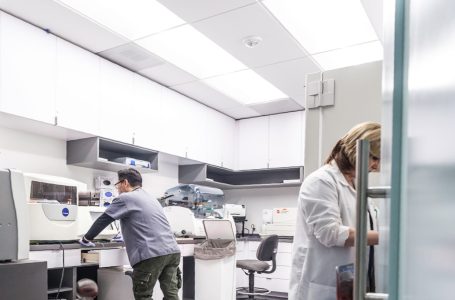
• Functional medicine and nutritional testing. Nutritional deficiencies have been linked to chronic conditions, so Attune’ s nutritional expert provides recommendations based on the patient’s highly-specialized test results.
• A movement and therapy room that incorporates cutting edge experiences such as Virtual Reality.
• Telemedicine visits, which are possible for some long-distance visits when the patient is traveling or off site.
• An infusion center where patients can receive biologic therapies that zero in on a specific molecule or other target. Experienced nurses administer over twenty approved infusion substances as well as any that are being offered experimentally as part of a research study conducted on the premises.
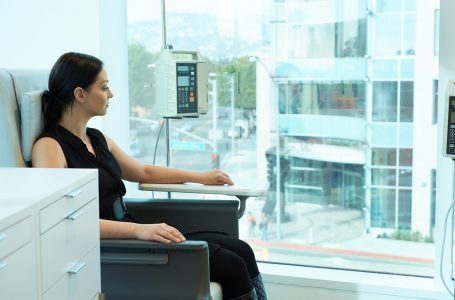
• A concierge wing that provides the quickest path to recovery by using Attune’ s technical abilities and access to leading consultants as needed to solve the patient’s challenges, all the while using their whole body/whole person approach. The Attune team carefully screens and selects a small group of concierge patients they believe can most benefit from their expertise.
Concierge Wing
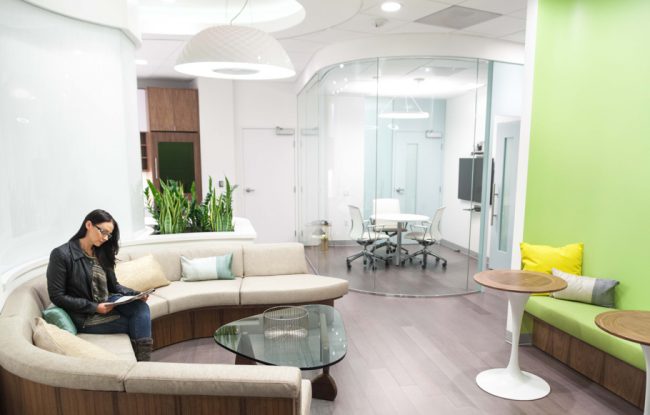
Dr. V continues, “The concierge aspect of the practice allows us to provide a higher level of care to a particular patient who needs us to put together a team around their specific auto-immune or inflammatory problem. The problem might be someone who has an auto-immune condition that has been hard to control using normal methodologies. We pull together the current status of what’s been tried and what has failed through the years of helping this patient. Following that, we figure out what other organ systems might be involved or might be contributing to the patient’s lack of progress. Next, we consult with other doctors or specialists in those areas and we would bring them into our suite so all of us can put our heads together. We’re able to solve a problem for the patient as a team. For example, we might want to start physical therapy or we might want to have a nutritional program put in place for the patient. The involvement of the physician in those aspects of the patient’s care is a critical element that is missing in most PT and nutritional programs because everyone is working in their own bubble and nobody’s really putting it together for the patient. That’s basically our concept: bring the best and the brightest together with our physician expert quarterbacking the process so we can achieve the best outcome possible.”
Attune Health as a Research Center
Dr. V points out that there are several types of research performed at Attune Health. One type that is very important, Outcomes Research, depends on the participation of the patients. People with diseases such as lupus, Sjogren’s, or scleroderma are followed over time while the staff takes research measurements on their condition. Between visits, when the newest technologies like biosensors are used, it can be seen how they’re doing over a long period of time. Thus the researchers at Attune can learn about what these diseases do and what conditions might worsen the disease and what might make it improve.
Then there are Drug Therapeutic Trials. These are sponsored by the pharmaceutical industry to test out new drugs for certain conditions. If some of Attune’ s patients are failing the standard therapy, the doctors will consider some of these experimental treatments.
Investigator-initiated Trials go something like this. A doctor might say, “In my practice, I see that patients respond to Drug X, but Drug X is not FDA approved for Condition A, which my other patient has. I’d like to try it on him.” The doctor petitions the drug company for free drugs, he writes a proposal, and he might get philanthropic support from the community or from research foundations. Then the doctor runs the clinical trial, not the pharmaceutical company. Right now, Attune Health has one such investigator-initiated approved trial underway and one more coming up soon.
New technologies is another thing Attune is working to bring into the clinic. They are trying Virtual Reality (VR), working with a start-up company that is developing software for mindfulness, relaxation, and also doing biofeedback using VR. When you’re wearing the VR glasses, you’re immersed in a different world. Then you can add audio to it and have a meditative experience like being on a beach, hearing the waves, and listening to a guided meditation. Since research has found chronic mental stress to be a trigger for autoimmune diseases, finding ways to provide relaxation and stress-free experiences could prove valuable.
Lastly, Attune is creating a Research-based Wellness Program that they will have tested out and shown that it improves outcomes in diseases like lupus and rheumatoid arthritis.
Attune Health is an academically-oriented practice in which all the providers are researchers. Dr. Wallace is the trailblazer who has been in clinical research for many years. He’s published many articles and written many book chapters, and although research is traditionally conducted in universities, Dr. Wallace has proven you can do good research in a private setting. Dr. V is following his lead and has published a fair amount as well. The two new rheumatology associates, Daphne Scaramangas-Plumley, MD and Christine Lee, MD, are interested in conducting research and give Attune Health more fire power in doing clinical outcomes research.
Advances in Technology
To Dr. V, the most exciting of these outcomes studies is the Lupus Biosensor Project, where they will be putting a FitBit onto the patients who have lupus and following them for three months. FitBits are activity trackers, wireless-enabled wearable technology devices that measure data such as the number of steps walked, heart rate, quality of sleep, steps climbed, and other personal metrics involved in fitness.

“We’ll also ask them questions on a weekly basis about how they’re doing, what are their stress levels, and we’ll monitor their sleep,” says Dr. V. “I’m really curious to see if there’s a correlation between stress, sleep, and how they’re doing, and I want to show that with real patients in a clinical setting. We would contrast that to the patients who aren’t wearing the biosensor (FitBit), who simply following the usual standard of care.”
“We’re at that very interesting stage where these potential technologies may really change the way we view disease and health.”
-Swamy Venuturupalli, MD
The physicians at Attune Health typically see their patients once every month or two, but what happens between visits was an area that was previously never addressed. Now with technology, they potentially have the ability to address that part of the patient’s life and the activity of their disease. Heart rate variability can give the doctors an idea of how much stress the patient is dealing with. They are doing the preliminary research now, so once they are able to show the new technologies add something and the patients are doing better as a result of them, then they should become standard of care. Dr. V sums it up: “We’re at that very interesting stage where these potential technologies may really change the way we view disease and health. We can now measure things in real time that we previously had only subjective ideas about. A patient tells us they’re not feeling well and their lupus is flaring – how to you define a flare? The FitBit will help us see if there are any signals we can pick up in terms of stress, lack of sleep, or activity that might predict that a patient is doing poorly before they actually complain to the doctor.”
“Now with wired homes and wired cars, the potential is boundless. You can have weight machines that communicate with your phone. We can get that data. We can get data on what you eat. New technologies sense what’s on your plate and give you a quick analysis. It knows the weight and the calories and the nutrient density and what vitamins you got and didn’t get. We can watch and tweak a few things and that can help.”
Dr. V quickly says that he’s not a “geek,” but that he’s not afraid of technology, and that he’s taking the lead on implementing new technologies into the clinic.
“Technology has entered every aspect of our lives in a short period of time. The more we utilize it, the more we reach our goals. But technology isn’t going to solve our problems; it’s how we apply it that’s going to solve the problems. Artificial intelligence (AI) is here to help. We’re generating billions and trillions of bits of information on a daily basis, and now there are computers that can make sense of all of it. I’m hoping AI will significantly accelerate medical discoveries so that we don’t have to wait for hundreds or thousands of patients to get sick before being able to recognize a pattern of cause and effect. With these AI systems, we should be able to get that sort of insight quickly.”
Dr. Venuturupalli, a Glimpse of the Man
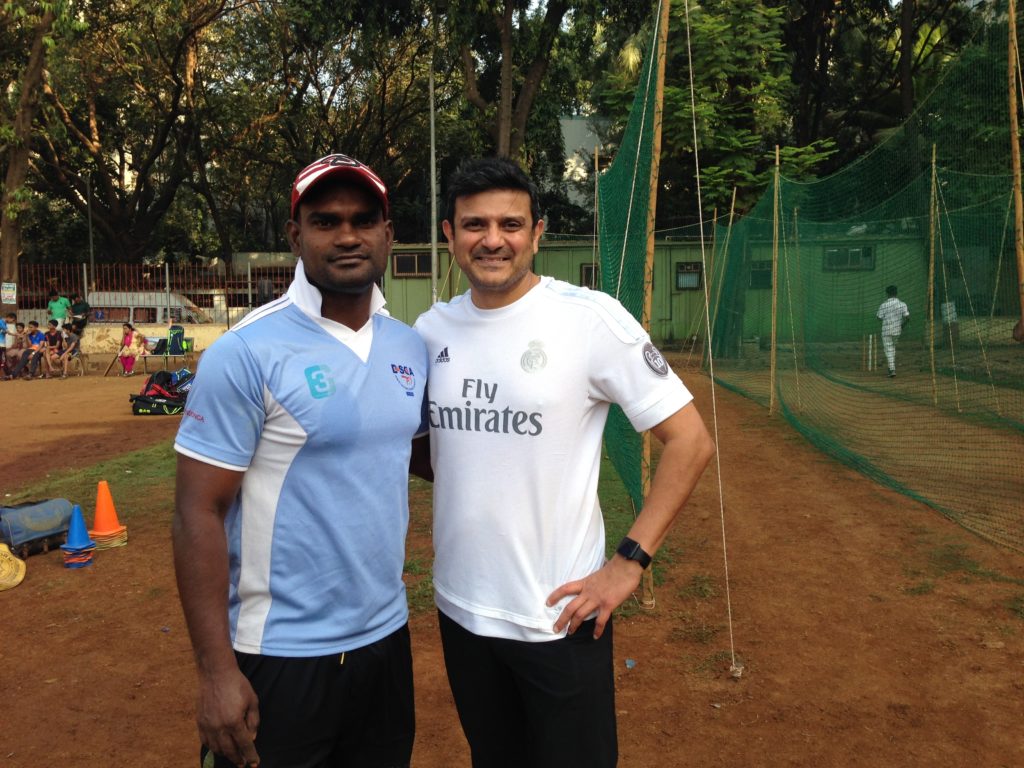
Dr. Venuturupalli with Indian Premier League cricketer Dinesh Salunke at Cricket nets.
“I became an American citizen this year,” says Dr. V. “I grew up in India where I played cricket and badminton. Then I benefitted from getting my higher education in the United States. Now that I have a team here at Attune Health, I feel much better about being able to achieve the really high goals we have set for ourselves, which is to cure auto-immune diseases. The initial work we’re doing is that of curating our program and bringing together the right people who can collaborate with us. It’s still a work in progress. Through my years of study and professional work, I’ve realized that one of the prerequisites to achieving success is to dream big.
“I’m married with two kids, ages nine and twelve. I have a physician wife who is in public health, working for the County of Los Angeles. Silver Lake is a good place for us to live, away from the pressure of the West Side. And if I get in early enough, the commute isn’t bad. The kids are into sports. I like soccer a lot, so I’m into coaching and refereeing their games. On weekends we go for walks or hikes in Griffith Park – you can get lost there. Then there’s the L.A. River, which is nice. It’s probably a little rougher than most people would want, but I’m fine with it.

“One of my sisters is in San Francisco and the other is in New York. My wife’s family is all in New York. We have a basic family life. Since we don’t have family in town, the kids get to see both of us every evening – finishing up homework, having dinner, and dealing with stuff at home. I exercise late in the evening. I go for a run or I go to the gym.
We love to travel to different places as a family, and usually do a national park once a year and an international destination when possible. India remains a special place for me and I try to go once a year.”
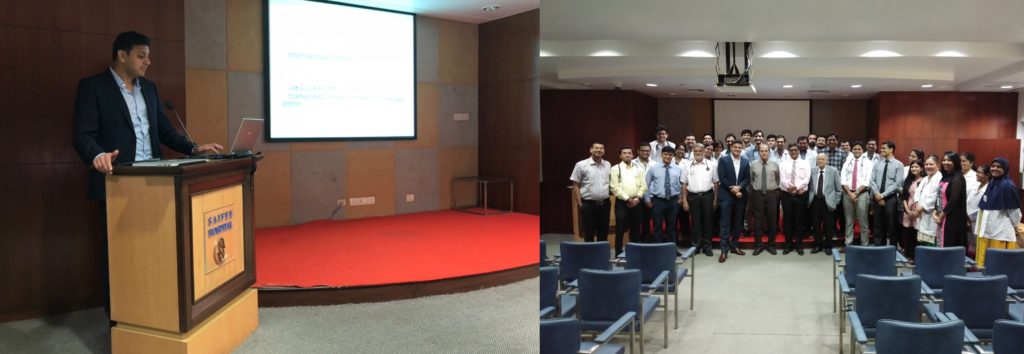
Dr. V was invited by the Saifee Hospital and Research Center, one of the leading hospitals in Mumbai, India, to give a lecture, “Rheumatology in the 21st Century: Lessons from Experiences in RA Research for Lupus.”
“I get most of my reading done on audio books while I’m driving or at night when I’m winding down. I’ll listen instead of making my eyes keep working like they’ve done all day. I’m catching myself doing too much work at home, so that’s something I’ll cut out on as we fine tune what we’re doing at the clinic.”
More than anything, I want people who have auto-immune or inflammatory conditions to know that I think there’s hope around the corner.
–Swamy Venuturupalli, MD
“There’s a lot of research and new technologies that I think will change the game. I’m really excited about that. We’re learning so much about nutrition and wellness and how those factors can impact auto-immune diseases for the better. In the next five to ten years, I think we’ll radically change how we’re treating these conditions, and I’m excited to be part of that change.
“More than anything, I want people who have auto-immune or inflammatory conditions to know that I think there’s hope around the corner.”
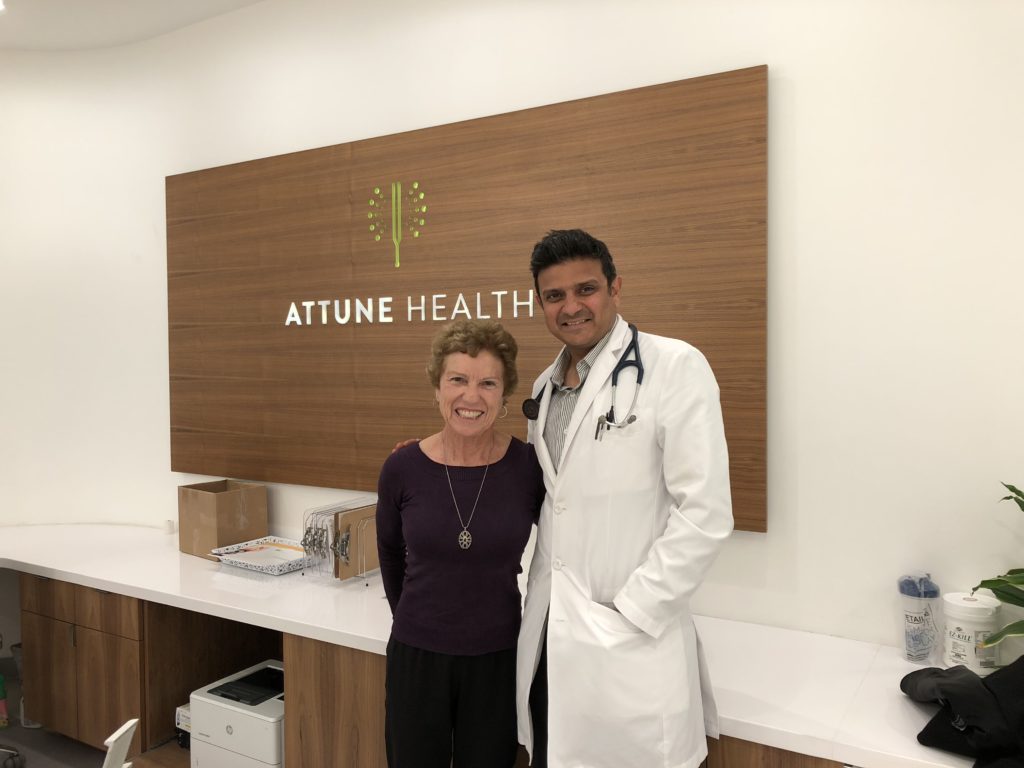
Water Rehab Specialist, Lynda Huey, MS, earned a bachelors and masters degree from San Jose State University where she also starred on the track and field team. Her own athletic injuries led her into the water where she learned to cross train and speed the healing of injuries. She has written six books on aquatic exercise and rehabilitation, books that are considered the foundation of aquatic therapy world-wide. Lynda is President of CompletePT Pool & Land Physical Therapy in Los Angeles.

